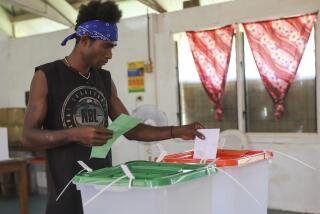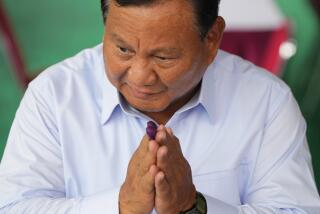Poverty, Despair Define Life in E. Timor : Society: Result of vote unlikely to fix territory’s dire economic status.
- Share via
DILI, Indonesia — When Australian teacher Robert Fuller returned to East Timor this week for the first time in 30 years, he was appalled to find a place that was shabbier and less developed than the one he had visited as a young backpacker.
“It’s like East Timor has regressed 200%,” said Fuller, 53, who came here to witness Monday’s U.N.-sponsored election in which 98% of the territory’s registered voters turned out to decide whether to become independent or remain an Indonesian province with wide-ranging autonomy. Results will be announced next week.
“The Portuguese at least kept Dili tidy, had a public transport system, developed the economy a bit,” Fuller said. “But Indonesia seems to have let the place rot on the vine. It doesn’t look like they did anything except build a military infrastructure and put some bitumen [asphalt] on the roads. That’s progress?”
Although Portugal can take little pride in its nearly four centuries of neglectful colonial rule, Indonesia hasn’t earned any bragging rights either. Its repressive 24-year rule appears to have left East Timor’s 800,000 people--80% of whom live at a subsistence level--worse off than they were under the Portuguese.
Coffee production has dropped by a third since Indonesian troops seized the territory in 1975, to about 9,000 tons of beans a year. Rice exports have evaporated. Per capita income is less than $300 a year, illiteracy rates top 35%, only 1,000 Timorese have college degrees, and government spending accounted for half of last year’s $113-million gross domestic product. The province attracts few tourists and has no industry and little obvious potential for development.
In Dili, a scruffy seaside provincial capital, trash litters the potholed streets, and only an occasional small freighter shows up in the harbor. Barefoot beggar children abound. Almost everything, from toilet paper to vegetables, is imported from the main Indonesian islands.
All this bodes ill for an independent East Timor and all but guarantees that the territory would be born into nationhood as one of the world’s poorest countries, with an economy based on international aid. Portugal has pledged substantial financial assistance if election results show, as expected, that voters chose independence.
East Timor’s only significant resources are unexploited natural gas reserves in Timor Gap, between Timor island and Australia, and oil fields in the same region that produce 20,000 barrels a day, which Australia and Indonesia split evenly.
“One possibility is a casino, another is tourism,” said Mario Carascalao, a Timorese who was the Indonesian-appointed governor of the province from 1982 to 1992.
Many Western diplomats believe that, in practical terms, East Timor would be better off as an autonomous province of Indonesia than as an independent nation. Indonesian President B.J. Habibie’s offer of autonomy includes giving East Timor its own flag and parliament and control of its internal affairs.
But the debate over the territory’s future has always been emotional, not intellectual, and East Timor’s sense of nationalism and resentment toward Indonesia have grown in proportion to the government’s unfulfilled promises, human rights abuses and inability or unwillingness to rein in pro-autonomy militias that have terrorized independence supporters.
Teresa da Reco, who is 17 and voted for independence Monday, said she will have a better life if East Timor breaks from Indonesia. But she isn’t sure exactly why, except that maybe the bloodshed and terror would end.
“I’m tired of running here and there to hide,” she said.
Anti-independence militias were active in Dili and scattered regions of the province Wednesday. In the most serious incident, hundreds of anti-independence militia members blockaded the U.N. headquarters here, forcing 150 U.N. personnel and journalists to seek refugee in an auditorium in the compound.
Witnesses said militia members killed and mutilated a 19-year-old man outside the compound.
The standoff occurred after anti- and pro-independence activists confronted one other outside the building that the U.N. uses for its headquarters. Anti-independence forces accuse the U.N. of rigging the vote to favor independence.
Riot police were dispatched to clear the area of militias. The situation remained tense today.
The human rights group Australia East Timor International Volunteer Project called for international peacekeepers.
But the government said there was no need for peacekeeping troops. “As I see it, the situation in East Timor has not reached a condition which needs foreign troops,” Foreign Ministry spokesman Sulaiman Abdulmanan told Reuters.
More to Read
Sign up for Essential California
The most important California stories and recommendations in your inbox every morning.
You may occasionally receive promotional content from the Los Angeles Times.










